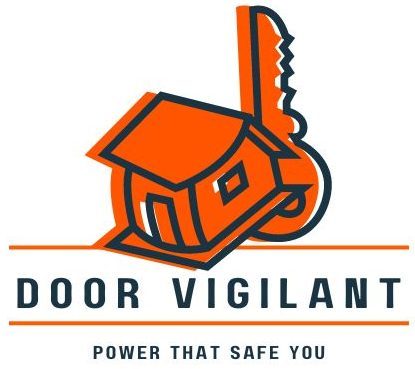Pivot doors can be secure, depending on the materials and hardware used in their construction. With proper installation and maintenance, pivot doors can offer a high level of security for your home or business.
As the demand for contemporary design continues to grow, pivot doors have become a popular choice among homeowners and architects alike. Pivot doors are a type of door that opens on a pivot hinge rather than traditional hinges that are attached to the frame.
They are known for their sleek and modern appearance, as well as their ability to create a grand entrance to any space. However, there is often concern about whether pivot doors are secure enough to be used for exterior entryways.
In this article, we will explore the security features of pivot doors and provide tips on how to ensure they are safe and secure for your home or business.
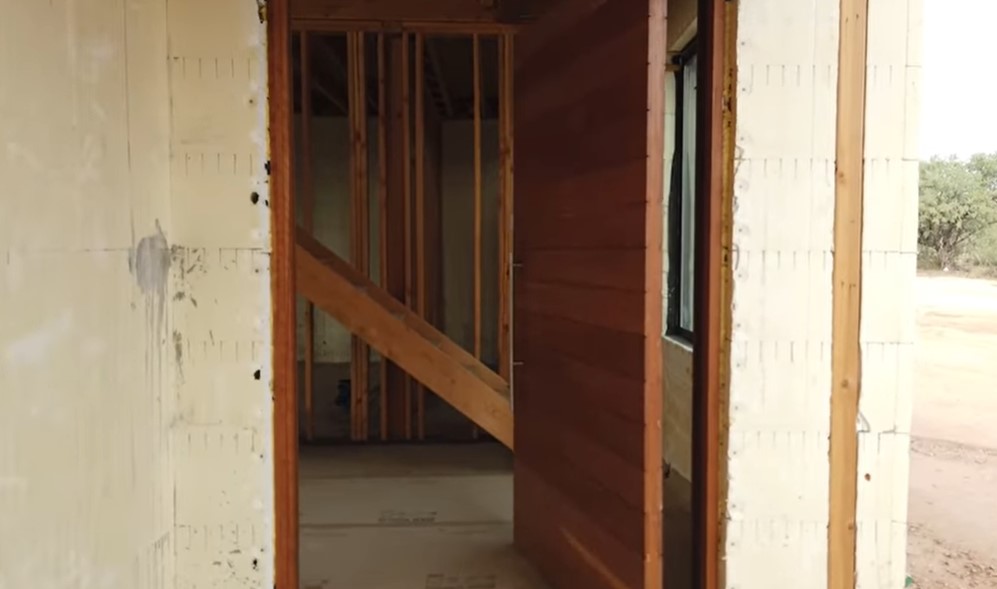
What Is A Pivot Door?
A pivot door is a type of door that rotates on a pivot point, typically located at the top and bottom of the door rather than on hinges on the side. This design allows the door to swing open and close around a central axis. Pivot doors are known for their modern and minimalist aesthetic and can be an attractive architectural feature in residential and commercial spaces.
The pivot mechanism supports the door’s weight from the top and bottom, enabling smooth and effortless movement. These doors often create a sense of grandeur and can be larger and more imposing than traditional hinged doors.
Pivot doors are popular in contemporary designs, providing a unique and stylish entrance while offering functionality and ease of use.
What is the advantage of a pivot door?
Pivot doors offer several advantages that make them a popular choice in architectural and design contexts:
- Modern Aesthetic: Pivot doors often have a sleek and contemporary appearance, contributing to a modern and minimalist design aesthetic.
- Large Size Options: Pivot doors can be larger and more imposing than traditional hinged doors, making them a preferred choice for entrances that demand a grand and dramatic statement.
- Smooth Operation: The pivot mechanism allows the door to rotate smoothly on a central axis, making it easy to open and close with minimal effort.
- Versatility in Design: Pivot doors can be designed with a variety of materials, finishes, and styles, offering flexibility to match different architectural preferences and interior designs.
- Architectural Focal Point: These doors often serve as a focal point in a space, adding a sense of uniqueness and sophistication to the overall design.
- Adaptability: Pivot doors can be adapted to various spaces, including residential homes, offices, and commercial establishments, providing versatility in application.
While pivot doors have these advantages, it’s essential to consider factors such as installation requirements and proper maintenance to ensure optimal performance.
What are the downsides of pivot doors?
While pivot doors offer unique advantages, they also come with some downsides that should be considered.
- Cost: Pivot doors can be more expensive than traditional hinged doors, especially if they are large or made with high-end materials.
- Installation Complexity: Proper installation is crucial for pivot doors, and their installation can be more complex than that of standard doors. Professional installation is often recommended.
- Maintenance: Pivot doors may require more maintenance than traditional doors. The pivot mechanism needs periodic checks, and adjustments may be necessary to ensure smooth operation.
- Weather Exposure: In certain climates, pivot doors may be more susceptible to weather exposure due to the larger gaps around the edges. This can impact insulation and energy efficiency.
- Limited Security Options: Security features like multi-point locking systems, commonly found in traditional doors, may be more challenging to implement in pivot doors.
- Space Requirement: The swing radius of a pivot door can be larger than that of a traditional door, requiring sufficient space in the room for unobstructed movement.
While these downsides exist, they might be outweighed by the aesthetic and functional benefits of pivot doors in specific design contexts. It’s crucial to carefully consider these factors based on individual preferences and practical considerations.
Pivot Door Vs Hinged Door
The choice between a pivot door and a hinged door often depends on specific design preferences, space considerations, and functionality. Let’s compare the two:
Pivot Door:
- Aesthetic Appeal: Pivot doors are known for their modern and sleek aesthetic, often making a bold design statement.
- Size and Impact: Pivot doors can be larger and more imposing than hinged doors, creating a dramatic entrance and serving as a focal point.
- Smooth Operation: Pivot doors rotate on a central axis, providing smooth and effortless operation. They can be easier to open and close, despite their size.
- Versatility: Pivot doors can be designed with a variety of materials and styles, offering versatility in design options.
Hinged Door:
- Traditional Look: Hinged doors have a classic and traditional appearance, suitable for a wide range of architectural styles.
- Cost-Effectiveness: Hinged doors are often more cost-effective than pivot doors, making them a practical choice for various budgets.
- Security Features: Hinged doors can easily accommodate multi-point locking systems, providing enhanced security features.
- Space Efficiency: Hinged doors typically have a smaller swing radius, making them more space-efficient in smaller rooms.
- Ease of Installation: Installation of hinged doors is straightforward, and a wide range of sizes and styles are readily available.
Ultimately, the decision between a pivot door and a hinged door depends on individual preferences, the desired design aesthetic, available space, and budget considerations.
How Pivot Doors Are Installed?
Pivot doors are fitted with pins at the top and bottom of the frame, allowing them to rotate in and out. These pins are connected to the door jamb, which is a structural component of the door.
Pivot doors are typically larger and heavier than traditional doors, making the installation process more complicated.
It is critical to consider the proper installation process since any failure could compromise the door’s security and structural integrity.
How Improper Installation Can Compromise Door Security?
Several factors can compromise the security of a pivot door. If the door’s pins are not correctly anchored to the jamb, the door may sag and be easy to pry open. If the door is not anchored correctly to the frame or floot, it can be lifted off the hinge, leaving it susceptible to unauthorized entry.
Moreover, if the door is not installed flush to the floor, intruders can force a gap between the door and the floor to gain entry into the building. Thus, it’s critical to ensure that a specialist installs pivot doors correctly.
Case Studies On Break-Ins Involving Pivot Doors
Several break-ins involving pivot doors have occurred, highlighting the importance of proper installation and security measures.
In one case, a robber entered a jewelry store by lifting the pivot door entirely off its hinges. In a separate instance, robbers leaned on the pivot door’s middle, which had not been appropriately secured, causing it to fold in half, allowing entry to the premises.
These case studies highlight the door’s vulnerability if it is not adequately installed or secured, emphasizing the importance of choosing a reputable supplier and specialist installer.
Recommendations For Secure Installations
The following recommendations are considered best practices when installing pivot doors, ensuring optimal security and structural integrity:
- Hiring a professional installer experienced in installing pivot doors
- Ensuring the door’s pins are correctly anchored to the door jamb
- Ensuring the door is installed correctly flush to the floor and frame
- Adding a strike plate for increased strength of the door-lock interface
- Installing a reinforced steel frame
- Adding a deadbolt lock
- Regularly maintaining and inspecting the door to ensure the door’s security is not compromised.
Proper installation of pivot doors is critical to ensuring optimum security and structural integrity. With the right installation and reinforcement methods and security features, pivot doors can provide reliable and elegant access while maintaining a secure environment.
Vulnerable Hardware Of Pivot Doors
Pivot Door Hardware Components
Pivot doors are gaining immense popularity due to their elegant and modern design. They have become a symbol of luxury and class, but how secure are they? To answer this question, we need to understand the hardware components of pivot doors.
Pivot doors have two important hardware components: the pivot hinge and the locking mechanism.
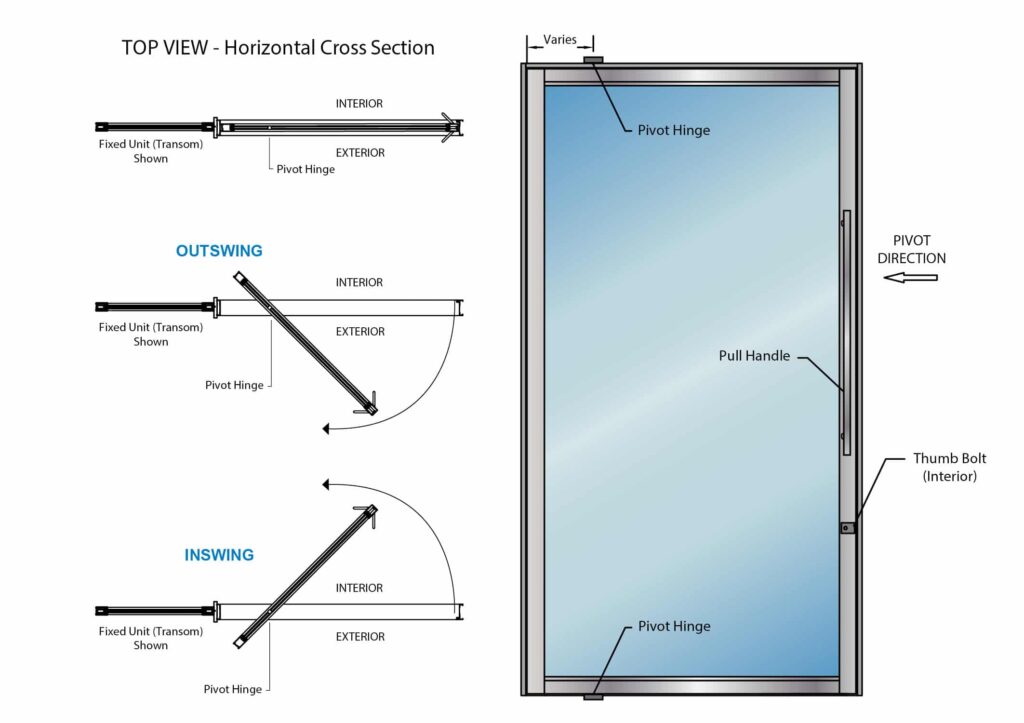
Common Vulnerable Hardware Components
Vulnerable hardware components can make pivot doors less secure. Here are some common vulnerable hardware components that you should be aware of:
- Lower-grade pivot hinges: Cheap pivot hinges may not be able to hold heavy doors, making pivot doors easier to break into.
- Low-quality locking mechanism: A basic lock can be easily opened with a simple lock-picking technique.
- Inadequate frames: The frames must be strong enough to withstand any external pressure.
- Weak glass: If the glass is weak, it can break or shatter, providing easy access to unwanted visitors.
Importance Of Investing In High-Quality Hardware
It is essential to invest in high-quality pivot door hardware to ensure the doors’ security. There are several benefits to buying high-quality hardware:
- Durability: High-quality hardware components last longer, which means you won’t have to replace them frequently.
- Enhanced security: High-grade, robust hinges and locks can keep the door more secure.
- Elegant design: High-quality hardware complements the pivot doors’ stylish design, enhancing the overall look of your home.
How To Identify And Replace Vulnerable Hardware
Now that you know what vulnerable hardware components are and the importance of investing in high-quality hardware, let’s look at how you can identify and replace the vulnerable hardware.
Here are some steps to follow:
- Inspect your pivot door hardware regularly to identify any weak components.
- Consult with a professional to know which components require replacement.
- Choose high-quality hardware components that align with the door’s weight and size.
- Hire a professional for installation to ensure proper installation and security.
Remember, pivot door hardware is an essential part of your home’s security, and it’s crucial to invest in high-quality hardware. By doing so, you can enjoy the security, durability, and elegant design that come with pivot doors.
Glass Security
Common Glass Types Used In Pivot Doors
There are common types of glass used in pivot doors, such as tempered glass, laminated glass, and annealed glass.
Limitations Of Traditional Glass
Traditional glass, like annealed and tempered glass, can pose security risks. Annealed glass can easily break and shatter into sharp edges, causing injury.
Meanwhile, tempered glass, while more durable than annealed glass, can shatter into small pieces when broken, making it easier for burglars to enter.
Introduction Of Laminated Glass
Laminated glass is an innovative type of glass that has two or more glass layers and interlayers bonded together. This creates an incredibly sturdy glass that is less likely to break through impact, making it more secure.
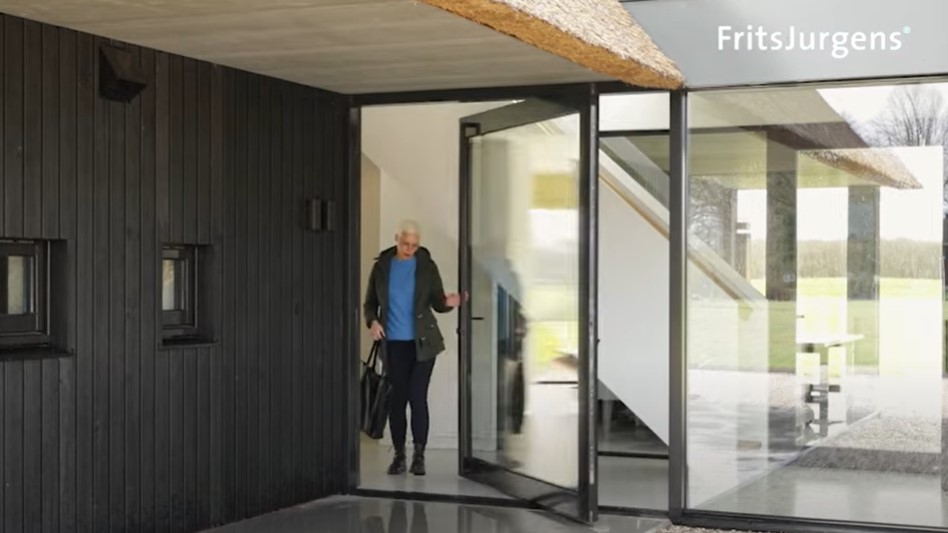
Benefits Of Using Laminated Glass For Pivot Doors
Here are some benefits of using laminated glass for pivot doors:
- Laminated glass is much safer than traditional glass, as it doesn’t shatter as easily when broken.
- The interlayer of laminated glass makes it harder for intruders to penetrate.
- The interlayer also makes laminated glass much more difficult to cut through using a glass cutter, further enhancing the level of security.
- Laminated glass can also provide added sound insulation and UV protection.
- It’s more durable, ensuring a longer lifespan than traditional glass types.
Overall, laminated glass is an excellent choice for pivot doors due to its high level of security, durability, and added benefits. By choosing laminated glass, homeowners can enjoy a secure and safe home without compromise.
Additional Security Measures
Pivot doors offer an elegant and modern option for home entrances. However, some homeowners may have concerns about their security. Fortunately, additional security options are available for pivot doors, which can provide peace of mind.
Here are some of these options:
- Installation of deadbolts and additional locks
- Alarm systems and surveillance cameras
- Security film for glass panels
- Consult with a security professional.
1. Installation Of Deadbolts And Additional Locks
One way to improve the security of a pivot door is by installing deadbolts and additional locks. Deadbolts provide an extra layer of security because they require a key or a code to open, making it difficult for intruders to pick or force open the lock.
Additional locks can also be installed to provide extra security.
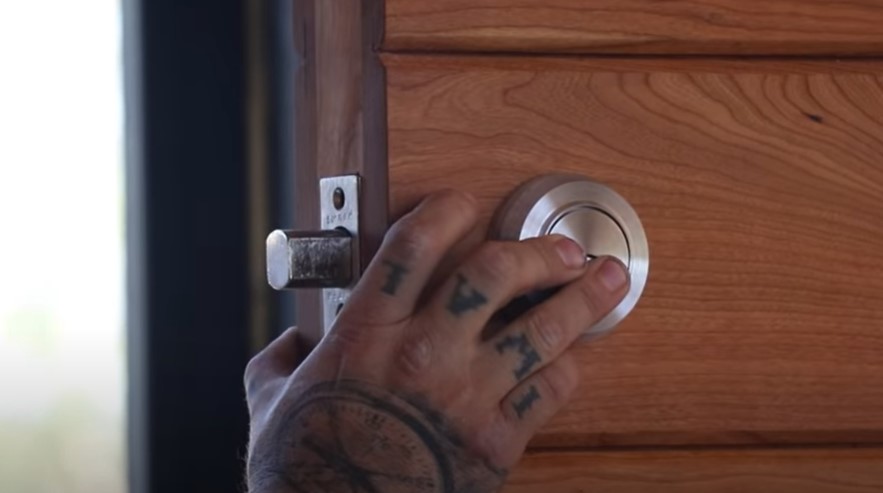
Here are some types of locks that can be installed:
- Single-cylinder deadbolts
- Double-cylinder deadbolts
- Keyless entry locks
- Smart locks.
2. Alarm Systems And Surveillance Cameras
Another way to enhance the security of a pivot door is by installing an alarm system or surveillance cameras. An alarm system can detect movements and notify homeowners or the building’s security staff in case of a security breach.
Surveillance cameras can provide monitoring and recording of any suspicious activities around the pivot door.
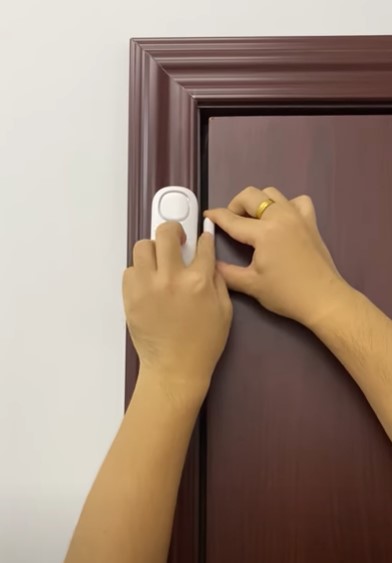
Here are some types of alarm systems and surveillance cameras that can be installed:
- Motion sensors
- Window and door sensors
- Indoor and outdoor cameras
- Cloud-based video monitoring.
3. Security Film For Glass Panels
Pivot doors often feature large glass panels that provide natural light and a modern look. However, glass panels can also pose a security risk if they can be easily shattered.
Security film can be applied to glass panels to provide shatter resistance, making it difficult for intruders to enter through the glass.
Here are some types of security film that can be applied:
- Security window film
- Impact-resistant film
- Solar control film.
4. Consulting With A Security Professional
While these additional security options can enhance the security of a pivot door, it is important to consult with a security professional. A security professional can inspect the home or building and make recommendations about the best options for enhancing security.
They can also provide expertise on the proper installation of security systems and ensure that the systems function effectively.
Overall, with the right additional security measures, pivot doors can be just as secure as traditional doors. It is important to consider the best options for enhancing security based on individual needs and consult with a security professional before making any security-related decisions.
FAQs: Are Pivot Doors Secure?
Are Pivot Doors More Secure Than Traditional Doors?
Pivot doors can be more secure than traditional doors with proper installation and hardware.
Do Pivot Doors Have A Locking Mechanism?
Yes, pivot doors have locking mechanisms such as deadbolts and latch bolts for added security.
Can Pivot Doors Be Reinforced?
Yes, pivot doors can be reinforced with additional metal framing and locking points for added security.
Are Pivot Doors Suitable For Exterior Use?
Pivot doors are suitable for exterior use but require weatherstripping and regular maintenance for longevity.
Conclusion
Overall, pivot doors are secure and can offer even greater security when the right measures are taken. It is important to choose a high-quality pivot door that is designed to be strong, durable, and secure. Additionally, installation should be done correctly and by a professional to ensure that the door functions properly and remains secure over time.
Pivot doors can also be customized with added security features, such as reinforced locking systems and bullet-resistant glass, to further increase their security. When properly designed and installed, a pivot door can not only provide an aesthetically pleasing entryway but also offer optimal security and peace of mind for homeowners and business owners alike.
So, if you are planning to install a pivot door, make sure to follow the guidelines discussed in this article to ensure that you get the most secure and durable pivot door for your property.
